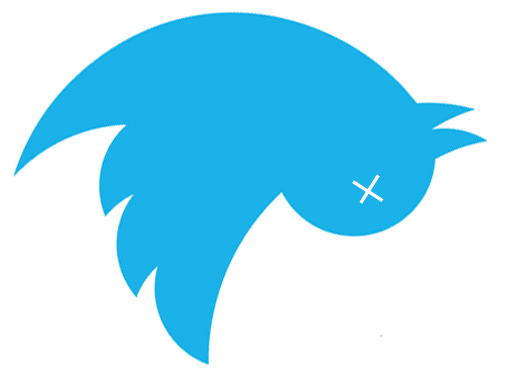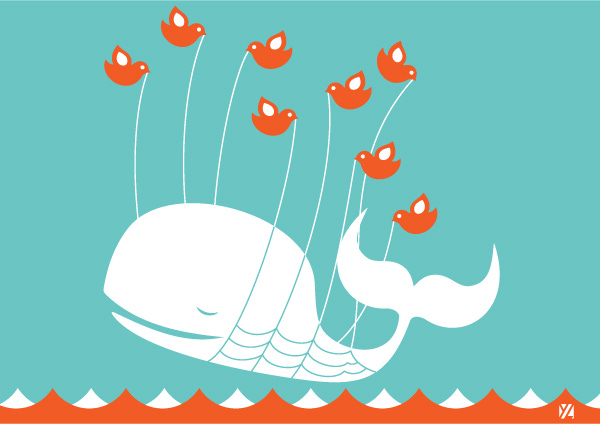So What, Who Cares (vol 2, issue 53) How big data 'bots cost two guys $750 million

Hello!
I didn't choose the Cyndi Lauper beat, it chose me (vol 2, issue 34; vol 2, issue 48), but today I am thrilled to share with you a link to Cyndi Lauper's testimony before a U.S. Senate appropriations subcommittee. She speaks eloquently about the 1.6 million homeless teens in the U.S., explains that 40% of them are gay or transgender, and asks: "The kids come out, and they get thrown out ... I ask you, 'Is that acceptable?'" Then she moves into her prescriptive recommendations. This is nine minutes of testimony and it's worth listening to, if not watching.
*

Twitter's stock tanked earlier this week -- the company stock plunged 18% on a one-two punch of bad news: the company's Q1 earnings came in 4% below projections and Twitter's Q2 revenue is expected to be 10-13% below analyst forecasts. In other words, Twitter's not making as much money as people think it should be. That's a big story -- especially if you're Evan Williams and Jack Dorsey, who are now worth $750 million less than they used to be -- but the more interesting story, in my opinion, is all about search. Because the reason Twitter's earnings leaked out early and the stock plunged is simple: a financial-data platform that specializes in automated data retrieval and context detection did something very, very right.
Selerity, a seven-year-old company that uses different tools to suck down information via the web, press releases, social media, etc., was able to pull Twitter's earnings results off its investor relations site, where the results had been quietly posted. Selerity then realized that hey, this data is newsworthy, and tweeted it. Cue the stock plunge.
So what? Selerity rocketed into the spotlight this week because it's confirmation that the right combination of big data tools can give a business a competitive edge -- all in an entirely legal way. Twitter's pointing fingers at NASDAQ's Shareholder.com service, which it pays to maintain its investor relations page -- an interesting approach and a smart PR move.
Who cares? Anyone who's in the business of controlling what information gets on the Web and when. This could really ding financial reporters, many of whom rely on the ol' "guess the URL" trick to find earnings releases early:
According to people familiar with the news outlet’s procedures, Bloomberg News journalists frequently scour corporate websites to see if they can find news releases posted early by companies who are parking news online expecting no one will see them.
These people say, for example, the Bloomberg journalists will type the Web address for a company’s first quarter earnings release, and then adjust the URL just to change the number of the quarter.

I am curious to see if companies are going to start releasing false data or putting up mercilessly troll-like web pages in response to adjusted URLs.
Also, people who use Twitter might care about the results. Twitter's revenue was down because it's working out the kinks for its advertising pricing and the demand for its ads, and if that weren't bad enough, user engagement in the ads -- i.e. people who click -- is down. The other problem is that the user base isn't growing as much as investors and analysts want to see it grow. There's a solid argument to be made that it's not the size of the user base that matters, it's how that base extends Twitter's influence beyond the social networking service. But the bottom line is that Twitter's growth is meeting some challenges. It's still unclear what this may mean for users later on.
*
Your pop culture moment of the day: Chris Offutt's essay "Trash Food," which is about food and social class, made it to Metafilter recently, but the essay that knocked me on my can earlier was published last fall in the Oxford American: "CIA Cake and Jeff Davis Pie." It's wonderful, meandering meditation on spycraft, comedy, cryptography and the power of food to unite or divide us.
I don't know why it is that southerners write about food and society with such devastating wit and insight (vol 2, issue 39), but I'm glad they do.
*
Are there typos? I apologize in advance. The only editing class I did not get an A in was copyediting.
Did you miss an issue of So What, Who Cares? The archive is here.
Would you like a run-down of all the books and other pop culture picks ever mentioned in this newsletter? Then check out the Pinterest board. (Note: None of the links are affiliate links; I do not make money off anything I link to.)
If you really like So What, Who Cares?, tell a friend to subscribe.

